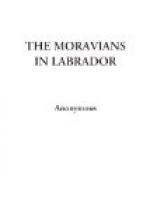During the winters 1796 and 1797, an infectious disease visited all the settlements, a violent cough, accompanied with fever and pleurisy; it attacked both Europeans and Esquimaux, but proved fatal chiefly to the latter, and lasted for about two months; at Nain it was so universal, that when they met together they could not proceed, as the coughing rendered the service altogether unintelligible. When an Esquimaux is taken ill, he expects, from any medicine that may be prescribed, an immediate cure, and if this does not take place grows dejected; and now, fears at the thoughts of death, which are deeply rivetted, shewed themselves even in believers. The missionaries were assiduous in their attendance, and in using every means they possessed for their cure; but learned, to their inexpressible grief, that the impatience of some also who had received the gospel, led them to follow the old superstitious ways of the sorcerers to procure relief, and this at the very time when they were professing to follow implicitly the prescriptions of the brethren. They were very cautious, however, lest it should reach the missionaries’ ears; nor do the latter seem to have been aware of it, till one of the communicants at Okkak, constrained by uneasiness of mind, confessed the whole with many tears, saving that he had grievously sinned against the Lord. The hypocrisy and equivocation which many, of whom they had hoped better things, evinced, added greatly to the anguish of the missionaries; but they had great consolation in the death of others, who departed happy in the faith to their Saviour. Among these was Daniel, a communicant; he said in his last illness, “All the things I had confidence




